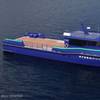IAATO Votes for Whale Protection Measures
The International Association of Antarctica Tour Operators (IAATO) voted measures into effect that will reduce the incidence of tourist ships striking whales around the Antarctic Peninsula.
The vote occurred at its annual meeting, held in Cape Town this year, and offers Antarctic tour operators two possible options: They must either commit to a 10-knot speed restriction within a specific time zone and area, or (if they already have a program to reduce whale strike) they must recruit an extra crewmate to monitor and record whale sightings within the said area and time zone.
These measures go into effect July 1, before the start of the 2019 – 20 Antarctic travel season, which begins in October.
Mark van der Hulst, Oceanwide Expeditions chief operating officer and IAATO executive committee chair, said of these new measures, “IAATO shows its commitment to safe and environmentally responsible travel through decisions like this. These measures were initially proposed as a smaller request, but IAATO members felt so strongly about them that we decided to make them mandatory.”
Van der Hulst added that both the Antarctic Treaty System and IAATO require tourism to impact Antarctica as little as possible, a goal for which IAATO has a strict and proactive track record. “This is a proud moment for IAATO,” he said, “and hopefully a defining one for the polar travel industry.”
Almost all humpback whale populations in the Southern Hemisphere have been on the rise since 1982, when commercial fishing for the species was banned. In fact, some of these populations have approached their biological maximum. Happywhale, an organization that tracks whales, recorded 900 humpback sightings in Antarctica this year compared to 700 sightings last year.
But these dense populations have the disadvantage of making whale strike more common, especially in areas where whales breed, socialize, migrate, and feed. IAATO’s new measures respond to this vulnerability, supporting the continued increase in whale populations.
Each year the tour operators that make up IAATO set aside their business competitions to engage in candid discussions on environmental protection, self-regulation, and safety for passengers and crew. Recommendations made over the tourism year by these member operators are then considered, and at annual meetings votes are held about which practices to implement.
IAATO was founded in 1991 and has a global network of over 100 members. It promotes safe, environmentally responsible private-sector travel to the Antarctic, working to develop and adopt operational standards that mitigate potential environmental impacts. These standards include but are not limited to site-specific landing guidelines, passengers limitations on shore, emergency procedures, and more.













